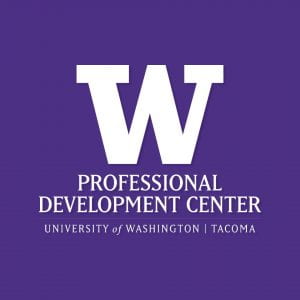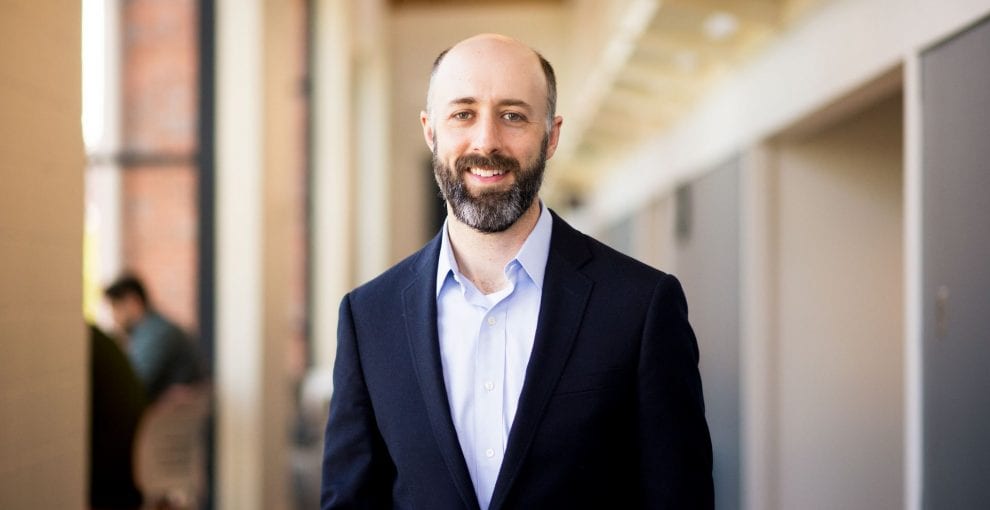Updated February 2021
The UW Tacoma Professional Development Center offers DEI workshops that are geared towards the development of local nonprofits and public sector organizations. Check out our upcoming workshops.
Students will spend a day exploring the drivers of institutional racism in the nonprofit space, as well as learning tools to advance equity and enact positive societal change through their organizations’ work.
Leading the workshop is Nick Bayard, Assistant Chief Equity Officer at the City of Tacoma. For Bayard, this is deeply personal work. Not only is he deeply active in the local nonprofit community, but as a member of a bi-racial family, Bayard remembers a watershed moment in uncovering some of his own blind spots regarding race and equity in our society.
“The moment that hit me the hardest was when I realized that I would have to think differently about how I raised my kids—who are African American—than my parents had to think about raising me,” he said.
“When I was a kid, I had a BB gun, and I played with it around the neighborhood, popping off tin cans and stuff. I was just the ‘kid with the BB gun.’ But I came to realize that the world sees a black boy with a gun much differently than it sees a white boy with a gun,” said Bayard. “Shortly after that realization, I saw news that a 12-year-old African American boy named Tamir Rice was killed by police in Cleveland because he was playing around with a toy gun in a park. That incident haunts me to this day, and needless to say, neither of my sons will own guns—real or play—while they are under our roof.”
Bayard’s family background has prepared him for this work, and he knows the importance of being prepared. Talking about race and equity can be a charged, sensitive matter.
Why now, does Bayard think it’s time for a workshop like this?
“The vast majority of nonprofit leaders are white. The vast majority of people that nonprofits in Tacoma are serving are people of color. That right there is enough justification for the course,” he said. “We can’t undo institutional racism without white people. You need to be able to create common ground even if there is disagreement.”
“As a white person having formed a bi-racial family, that’s opened my eyes to a lot of blind spots I had,” he said. “It’s an experience that has helped me navigate the natural defensiveness a lot of white people feel around issues of race and equity.”
Nonprofit organizations regularly deal with people in need. Whether their work takes shape through advocacy, direct service or some other method, nonprofits all identify problems and strive to positively affect them. However, that work can often fail to consider how it plays out within an institutionally racist system. Sometimes, that blind spot can actually perpetuate racial inequity and the problems a nonprofit seeks to address in the first place.
It can be a problem fed in some part by a lack of shared definitions. Bayard defines working toward racial equity as, “setting our systems and institutions on a course where the opportunities and resources available to people are not just equal but take into consideration the fact that certain groups of people are born and raised with a head start.”
We should aim to develop “our schools, our government, our businesses so that they’re not just nondiscriminatory in an institutionally racist system, but so that they’re actually anti-racist,” said Bayard. “If you’re nondiscriminatory and the world is discriminatory, all you are doing is maintaining the status quo.”
It is difficult work – and that is where this workshop comes in.
“It’s difficult to know how to move the needle on institutional racism,” said Bayard. “Do you do it implicitly or explicitly, overtly or covertly – those are fascinating questions because I think depending on the context, you can actually do more damage than good if you approach this work in the wrong way.”
Despite the complexity of the issue, Bayard said a one-day workshop is an apt environment to begin this work.
“It forces people to really decide what’s important and hone in on what they want to be doing,” said Bayard. “I’m hoping that most of the people who come to this course are entrepreneurial and have the drive to do something different in the world – and what I hope they take from it is not necessarily a clear roadmap for the next three years, but a sharper way of asking questions of themselves. We’re training people to have an investigative mindset about their own change-making ambitions.”
Of course, learning an investigative mindset can lead to a lot of questions. What if attendees leave asking more questions than before they came?
“That would be fantastic,” said Bayard. “The key is to never feel like you’ve arrived; it’s lifelong work for people and organizations.”
“I heard someone describe racism like dental hygiene. It’s not a root canal that you can dig out and be done – you’ve got to keep brushing your teeth every day,” he said.

